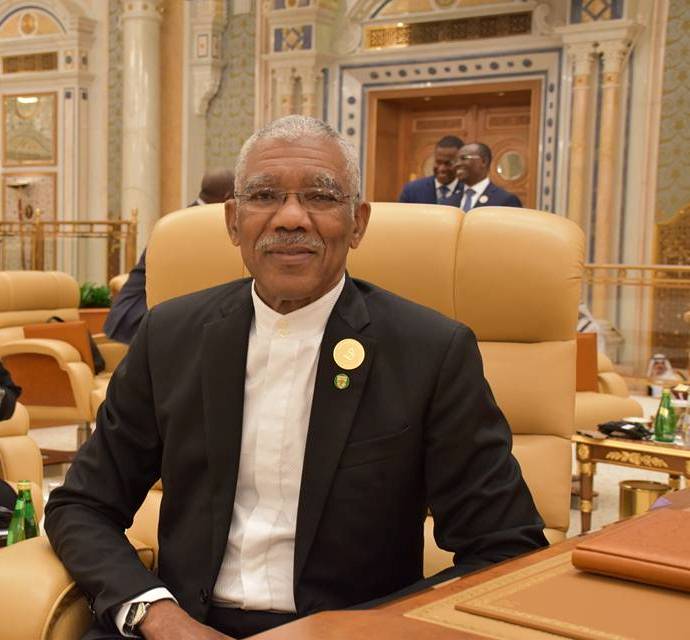Although accepting its “interim” status based on the judgment of the Caribbean Court of Justice (CCJ), the APNU+AFC government yesterday declared that Cabinet is continuing to function, in apparent defiance of the Constitution.
“The Government accepts that it is an ‘interim’ government but emphasises that Cabinet has not stopped functioning and government must continue to provide public services,” the Ministry of the Presidency said in a statement last evening.
The continued functioning of Cabinet would be in clear violation of the provisions of Article 106 (6) of the Constitution, which requires its resignation, including that of the president, as was pointed out by the CCJ on Friday. The announcement came amidst efforts by the representatives of President David Granger and Opposition Leader Bharrat Jagdeo to arrange a meeting between them.
Efforts to contact Jagdeo last evening for a comment on the announcement were unsuccessful.
The CCJ, which is Guyana’s final appeal court, on Friday declared that the December 21st, 2018 motion of no-confidence against the government was properly passed by the National Assembly and that the clear provisions of Article 106 immediately became engaged.
Article 106 (6) stipulates that “The Cabinet including the President shall resign if the Government is defeated by the vote of a majority of all the elected members of the National Assembly on a vote of confidence.”
Article 106 (7) adds, “Notwithstanding its defeat, the Government shall remain in office and shall hold an election within three months, or such longer period as the National Assembly shall by resolution supported by not less than two-thirds of the votes of all the elected members of the National Assembly determine, and shall resign after the President takes the oath of office following the elections.”
The Ministry of the Presidency statement cited Article 106(7) but did not explain its failure to adhere to the provisions of 106(6).
“The government will comply with the orders issued by the CCJ that, during this interim period it will restrain the exercise of its legal authority,” the statement also noted, while explaining that government will limit its activities to the routine management of the country.
Additionally, the government has committed to addressing “urgent issues that are in public interest” and to consult with the opposition on matters which require the agreement of both sides.
One such matter is the appointment of a Chairperson of the Guyana Elections Commission (GECOM).
The statement said government has agreed with the CCJ’s declaration that it is of greatest importance that the President and the Leader of the Opposition conclude the process of appointing a new Chairperson of GECOM.
“It is to be noted that the Elections Commission is responsible for holding elections and not the Executive. GECOM therefore has to advise the President of its readiness to conduct elections,” the statement added.
According to government, it is confident that the appointment of a GECOM Chairperson, which it says is an important step in continuing the elections process, could occur in a few days.
While government said it remains committed to holding in the shortest possible time, it added that “credible elections are dependent on, in part, the integrity of the Official List of Electors,” which is a reference to its insistence on the holding of a national house-to-house registration exercise prior to the holding of elections.
Jagdeo, whose party’s support would be needed to pass a resolution to extend the time for the holding of the elections, has refused to return to Parliament and has insisted that the polls should be held within three months of the CCJ’s initial finding on June 18th that the passage of the no-confidence motion was valid.
He told reporters on Friday that he will not support a resolution to extend the time for the holding of polls since government has acted in “bad faith” since the December 21 vote.
On December 21st, a vote of no-confidence in government was passed by the votes of 33 of the 65 members of the National Assembly, after government member Charrandass Persaud opted to vote for the opposition-sponsored motion.
On June 18th, the CCJ upheld the validity of the vote and noted on Friday that the Cabinet ought to resign and elections be held in accordance with the Constitution.
The question of the form in which such a resignation should take is not clear.
The most recent resignations of Cabinets have occurred in Burkina Faso in January and Mali in April but those appeared to be in response to continued security unrest in those countries.
The last resignation triggered by a no-confidence vote was that of Canadian Prime Minister Stephen Harper in 2011. Immediately after his defeat, Harper in accordance with constitutional convention, advised the Governor General to call a general election, which was held within five weeks.






